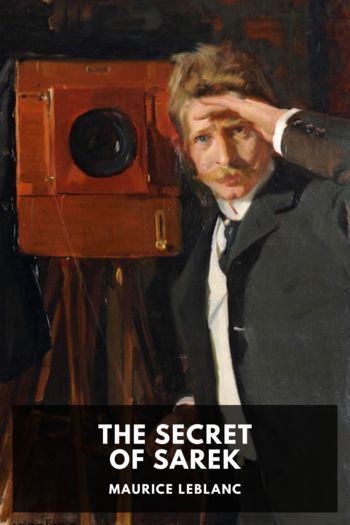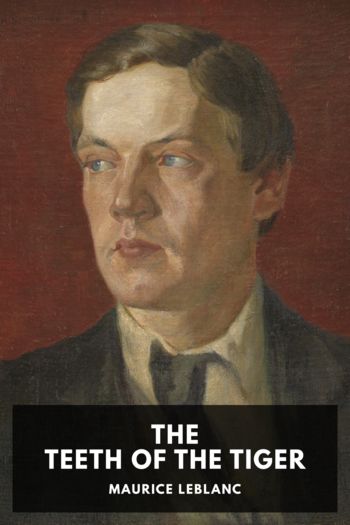The Secret of Sarek - Maurice Leblanc (easy to read books for adults list TXT) 📗

- Author: Maurice Leblanc
Book online «The Secret of Sarek - Maurice Leblanc (easy to read books for adults list TXT) 📗». Author Maurice Leblanc
“So I shall see him?” exclaimed Véronique, turning very pale.
“You will see him. Fold your veil double, so that he may not know you from your photographs. I’ll speak to you as I would to a stranger who has come to look at Sarek.”
They could see the island distinctly, but the foot of the cliffs was hidden by a multitude of reefs.
“Ah, yes, there’s no lack of rocks! They swarm like a shoal of herring!” cried Honorine, who had been obliged to switch off the motor and was using two short paddles. “You know how calm the sea was just now. It’s never calm here.”
Thousands and thousands of little waves were dashing and clashing against one another and waging an incessant and implacable war upon the rocks. The boat seemed to be passing through the backwater of a torrent. Nowhere was a strip of blue or green sea visible amid the bubbling foam. There was nothing but white froth, whipped up by the indefatigable swirl of the forces which desperately assailed the pointed teeth of the reefs.
“And it’s like that all round the island,” said Honorine, “so much so that you may say that Sarek isn’t accessible except in a small boat. Ah, the Huns could never have established a submarine base on our island! To make quite sure and remove all doubts, some officers came over from Lorient, two years ago, because of a few caves on the west, which can only be entered at low tide. It was waste of time. There was nothing doing here. Just think, it’s like a sprinkle of rocks all around; and pointed rocks at that, which get at you treacherously from underneath. And, though these are the most dangerous, perhaps it is the others that are most to be feared, the big ones which you see and have got their name and their history from all sorts of crimes and shipwrecks. Oh, as to those! …”
Her voice grew hollow. With a hesitating hand, which seemed afraid of the half-completed gesture, she pointed to some reefs which stood up in powerful masses of different shapes, crouching animals, crenellated keeps, colossal needles, sphynx-heads, jagged pyramids, all in black granite stained with red, as though soaked in blood.
And she whispered:
“Oh, as to those, they have been guarding the island for centuries and centuries, but like wild beasts that only care for doing harm and killing. They … they … no, it’s better never to speak about them or even think of them. They are the thirty wild beasts. Yes, thirty, Madame Véronique, there are thirty of them. …”
She made the sign of the cross and continued, more calmly:
“There are thirty of them. Your father says that Sarek is called the island of the thirty coffins because the people instinctively ended in this case by confusing the two words écueils and cercueils.1 Perhaps. … It’s very likely. … But, all the same, they are thirty real coffins, Madame Véronique; and, if we could open them, we should be sure to find them full of bones and bones and bones. M. d’Hergemont himself says that Sarek comes from the word Sarcophagus, which, according to him, is the learned way of saying coffin. Besides, there’s more than that. …”
Honorine broke off, as though she wanted to think of something else, and, pointing to a reef of rocks, said:
“Look, Madame Véronique, past that big one right in our way there, you will see, through an opening, our little harbour and, on the quay, François in his red cap.”
Véronique had been listening absentmindedly to Honorine’s explanations. She leant her body farther out of the boat, in order to catch sight the sooner of her son, while the Breton woman, once more a victim to her obsession, continued, in spite of herself:
“There’s more than that. The Isle of Sarek—and that is why your father came to live here—contains a collection of dolmens which have nothing remarkable about them, but which are peculiar for one reason, that they are all nearly alike. Well, how many of them do you think there are? Thirty! Thirty, like the principal reefs. And those thirty are distributed round the islands, on the cliffs, exactly opposite the thirty reefs; and each of them bears the same name as the reef that corresponds to it: Dol-er-H’roeck, Dol-Kerlitu and so on. What do you say to that?”
She had uttered these names in the same timid voice in which she spoke of all these things, as if she feared to be heard by the things themselves, to which she was attributing a formidable and sacred life.
“What do you say to that, Madame Véronique? Oh, there’s plenty of mystery about it all; and, once more, it’s better to hold one’s tongue! I’ll tell you about it when we’ve left here, right away from the island, and when your little François is in your arms, between your father and you.”
Véronique sat silent, gazing into space at the spot to which Honorine had pointed. With her back turned to her companion and her two hands gripping the gunwale, she stared distractedly before her. It was there, through that narrow opening, that she was to see her child, long lost and now found; and she did not want to waste a single second after the moment when she would be able to catch sight of him.
They reached the rock. One of Honorine’s paddles grazed its side. They skirted and came to the end of it.
“Oh,” said Véronique, sorrowfully, “he is not there!”
“François not there? Impossible!” cried Honorine.
She in her turn saw, three or four hundred yards in front of them, the few big rocks on the beach which served as a jetty. Three women, a little girl and some old seafaring men were waiting for the boat, but no boy, no red cap.
“That’s strange,” said Honorine, in a low





Comments (0)